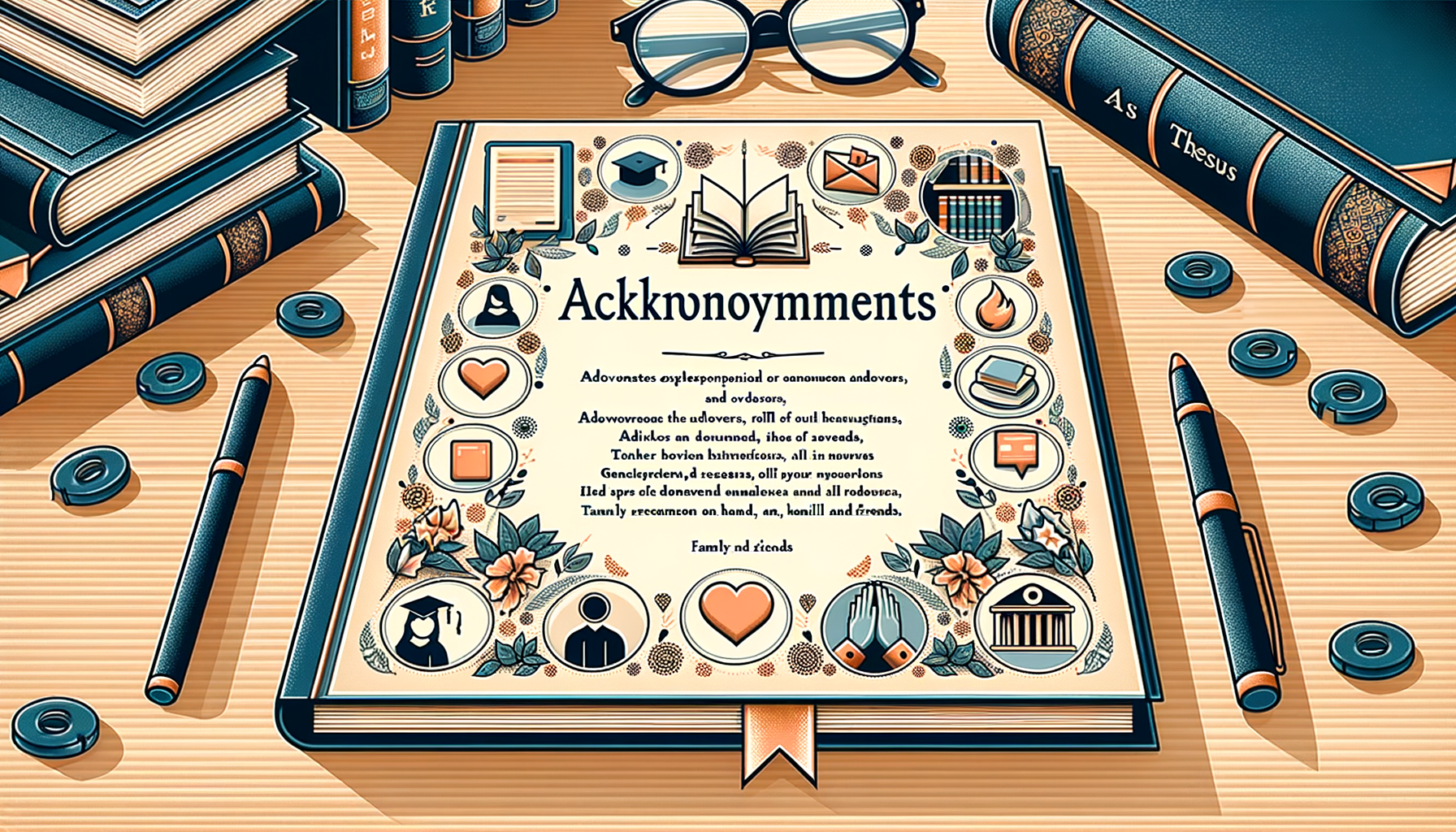How to Write Beautiful Thesis Acknowledgements: A Complete Guide
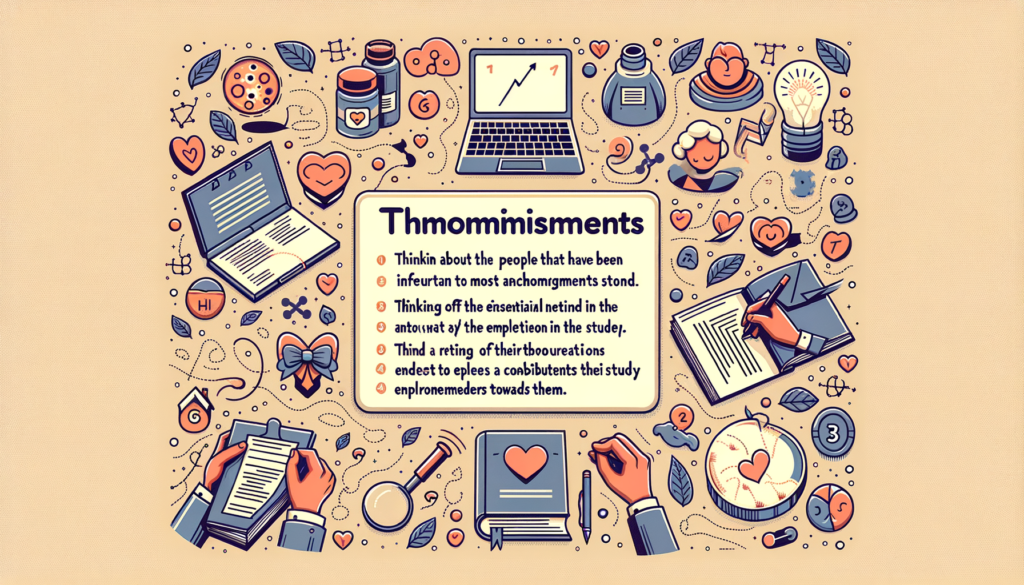
Crafting a beautiful thesis acknowledgement is more than just a formality; it’s a chance to express genuine gratitude to those who have supported you. In a section often overlooked, the thesis acknowledgement page can set a warm tone for your entire thesis. It highlights the people and support networks that have contributed to your academic success. This personal touch not only showcases your appreciation but also creates a sense of connection with your readers, making your writing process more relatable and impactful. Whether it’s mentors, committee members, family, or friends, acknowledging their role can leave a lasting, heartfelt impression.

Understanding Thesis Acknowledgements
Crafting thesis acknowledgement sample is not just a customary practice but a heartfelt opportunity to extend appreciation to those who have contributed to your academic journey. It serves as a platform to express gratitude, recognize support, and underscore the collaborative essence of academic endeavors.
Purpose of Thesis Acknowledgements
Thesis acknowledgements play a pivotal role in academic writing by recognizing the support and contributions from individuals and organizations. Here are some reasons why they are essential:
- Express gratitude: Acknowledgements offer a space to thank those who have provided guidance, emotional support, and encouragement throughout the thesis process.
- Highlight collaboration: Academic work is often collaborative, involving advisors, peers, family, close friends, and even funding bodies for their generous support. Acknowledgements highlight this teamwork.
- Showcase support: Recognizing the list of people who helped you can also illustrate the support network that contributed to your success.
- Personal touch: Including acknowledgements can add a personal element to your academic work with a special mention, making it more relatable and engaging for readers.
Etiquette and Guidelines
When writing acknowledgements, following proper etiquette and guidelines ensures your appreciation is conveyed effectively:
- Whom to acknowledge:
- Academic Advisors: Always acknowledge your thesis advisor and any other mentors who guided you academically.
- Research Collaborators: Recognize peers, and best friends who contributed to your research through collaboration.
- Family and friends: Appreciate the emotional and practical support that family and friends have given you with constructive feedback.
- Funding Bodies and Institutions: If applicable, thanks to any organizations that funded your research.
- Tone and Length:
- Sincere and Respectful: Use a tone that is genuine and appreciative. Avoid overly formal or overly casual language.
- Concise: Keep your acknowledgements brief. Aim for a few paragraphs that succinctly appreciate key supporters without becoming lengthy.
By following these guidelines, your acknowledgements will be well-received and will add a personal, heartfelt dimension to your thesis.
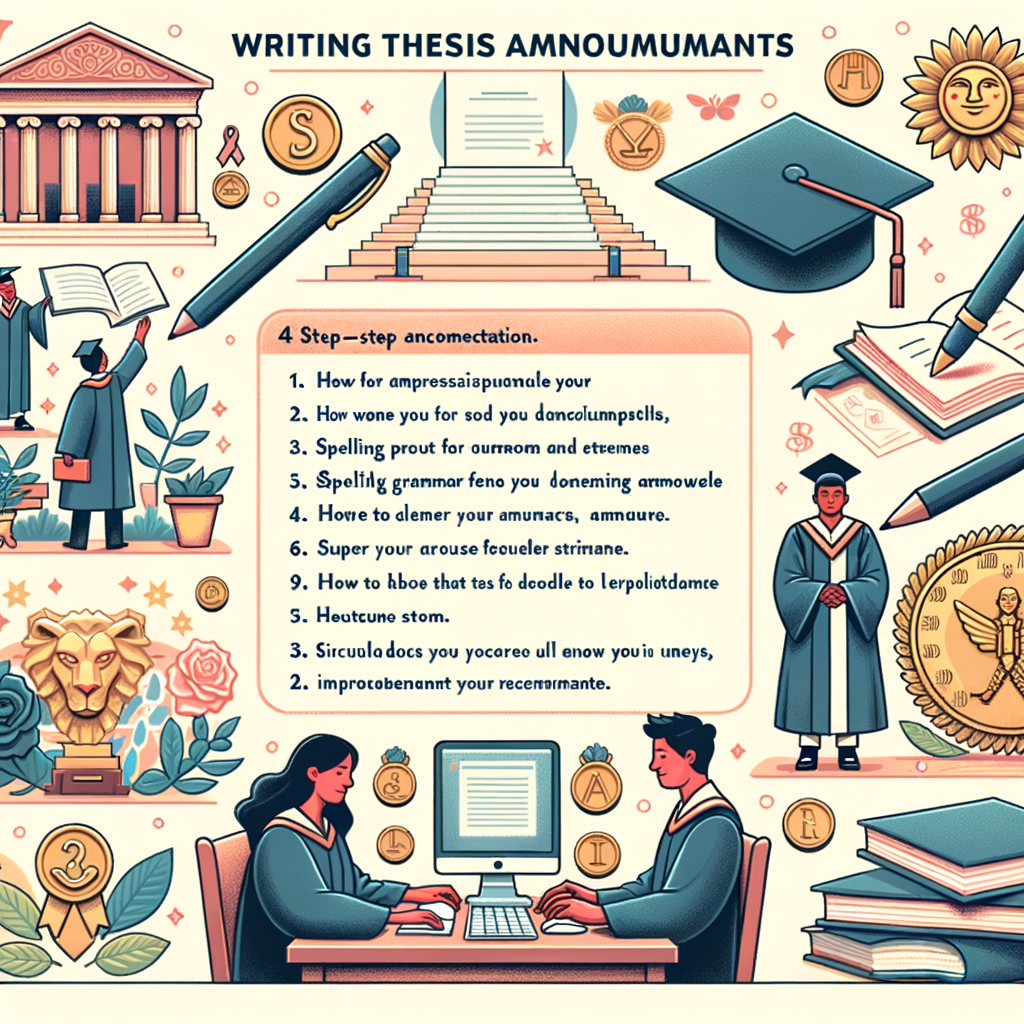
Photo by RDNE Stock project
Structuring Your Acknowledgements
Crafting the acknowledgements section of your thesis is an opportunity to give credit to the various individuals and organizations that have supported you throughout your academic journey. By structuring this section thoughtfully, you can effectively acknowledge, with special thanks, different contributors and add a personal touch of gratitude.
Acknowledging Different Contributors
When writing your acknowledgements, it’s essential to acknowledge the diverse group of contributors who have played a crucial role in your academic success. Here’s how you can respectfully and concisely acknowledge different contributors for their continuous support:
- Academic Supervisors: Begin with your academic supervisors, who provided invaluable guidance and mentorship throughout your research.
- Fellow Researchers: Recognize fellow researchers or colleagues who collaborated with you on various projects and helped shape your thesis.
- Funding Bodies: Offer your thanks to any funding bodies or institutions that provided financial support, which might have been crucial for your research in different ways.
- Family Members: Don’t overlook the emotional and moral support from your family members; their encouragement often plays a significant role in your perseverance.
Including these different contributors in your acknowledgements demonstrates your appreciation for the varied forms of support you received.
Personal Touch and Gratitude
Infusing your acknowledgements with a personal touch, sincere thanks, and genuine gratitude can significantly enhance the emotional impact of this section. Here’s why adding a personal touch is crucial:
- Emotional Connection: By adding personal anecdotes or heartfelt messages for the collaborative efforts, you can create a stronger emotional connection with your readers.
- Authenticity: Expressing genuine gratitude showcases your sincerity and appreciation for the technical support you received.
- Memorable Impact: A personalized acknowledgment section leaves a lasting impression on your readers, making your thesis more memorable.
Remember, a simple “thank you” goes a long way in acknowledging the contributions of others and expressing your gratitude for their invaluable support in your academic accomplishments.

Photo by
Writing Tips for Beautiful Acknowledgements
Crafting heartfelt and eloquent acknowledgements requires attention to detail and sincerity. By following these thesis writing tips, you can create acknowledgements that resonate with readers and convey genuine and sincere gratitude effectively.
Using Language Effectively
When composing an acknowledgement page, the language you use plays a crucial role in setting the tone and conveying your appreciation. Here are some tips to ensure your language is effective:
- Appropriate Language: Choose words that are respectful and formal to maintain a professional tone throughout your acknowledgement sample.
- Avoid Clichés: Steer clear of overused phrases or clichés that may dilute the sincerity of your gratitude. Instead, opt for personalized expressions that reflect your genuine appreciation.
- Maintain Formality: While expressing sincerity, it’s essential to strike a balance and avoid overly sentimental or informal language that may undermine the professional nature of your acknowledgement.
To create an impactful acknowledgement, focus on using language that is both respectful and heartfelt, conveying your gratitude authentically.
Showcasing Sincerity
Authenticity is key when it comes to professional acknowledgements. To ensure the deepest gratitude resonates with sincerity, consider the following strategies:
- Express Genuine Appreciation: Be specific in acknowledging the contributions of individuals or organizations, highlighting the unique ways in which they have supported you.
- Avoid Generic Statements: Tailor your acknowledgements to reflect personal experiences and express gratitude in a way that is genuine and heartfelt.
- Emphasize the Impact: Clearly articulate how the support received has influenced your academic journey and demonstrate sincere appreciation for the assistance provided.
By showcasing sincerity in your acknowledgements, you not only convey gratitude effectively but also create a lasting impression of appreciation for your readers.
P
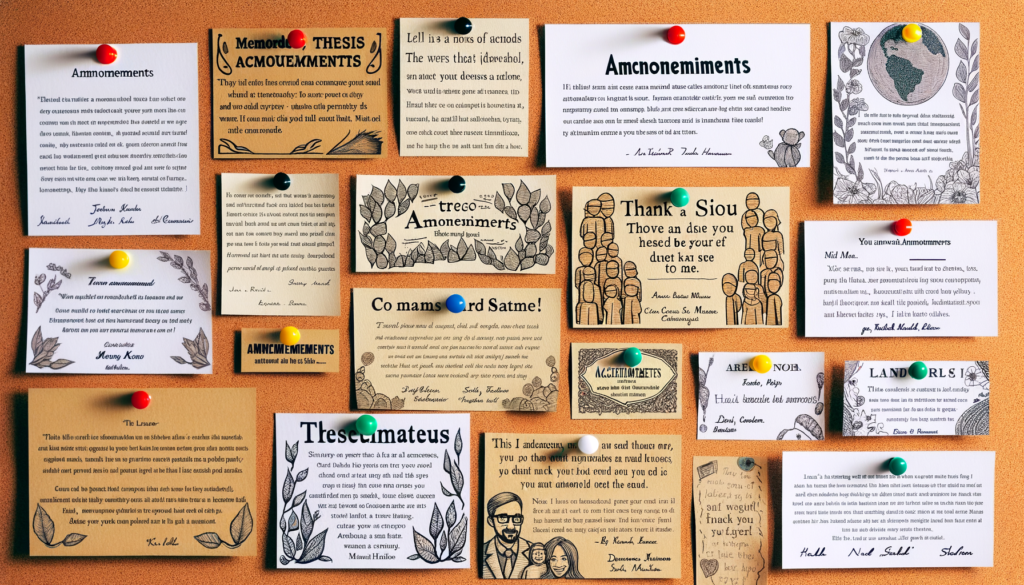
Examples of Memorable Acknowledgements
Crafting memorable thesis acknowledgements involves a delicate balance of gratitude, sincerity, and personal touch. Let’s explore some exemplary acknowledgements to glean insights on how to create impactful and heartfelt appreciations.
Case Studies and Analysis
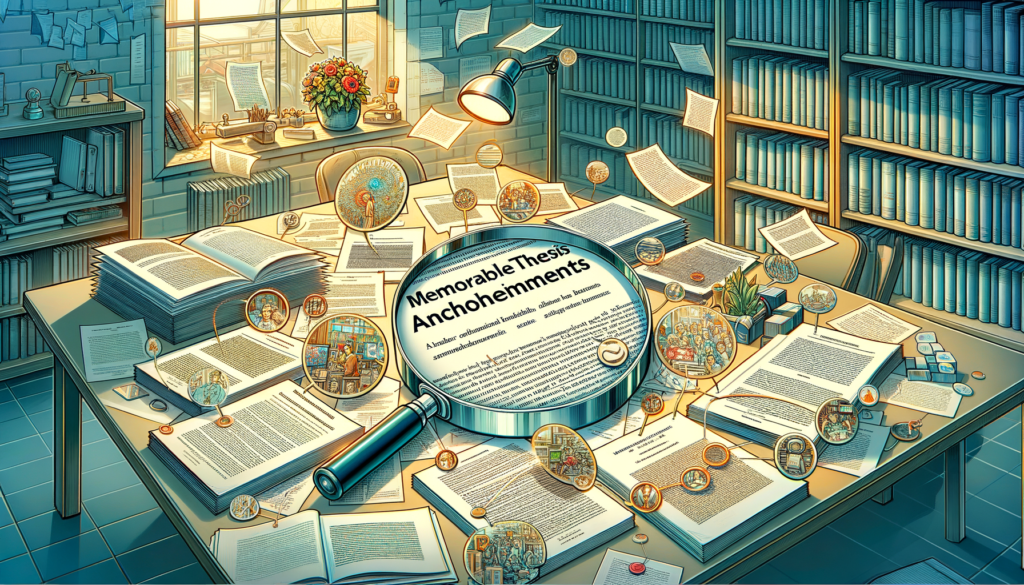
Example 1: Dr. Emily Roberts
In her thesis, Dr. Emily Roberts eloquently thanked her academic advisor, Dr. Patel, for his unwavering guidance and insightful feedback that shaped her research. By acknowledging the late-night brainstorming sessions and constructive critiques, Dr. Roberts showcased a deep appreciation for Dr. Patel’s mentorship. This acknowledgment stands out for its specificity and heartfelt tone, underscoring the importance of recognizing individual contributions.
Dr. Roberts’ words:
“I am deeply indebted to Dr. Patel for his relentless support and invaluable advice. The late nights we spent brainstorming solutions and his constructive criticism have been pivotal in shaping this thesis.”
Example 2: John Davies
John Davies’ acknowledgements extended beyond his academic circle to express gratitude to his parents for their unwavering support and belief in his academic pursuits. By weaving in personal anecdotes of childhood memories and familial encouragement, Davies created a touching acknowledgment that resonated with readers. This example highlights the power of infusing personal stories into acknowledgements to create a lasting impact.
Davies’ heartfelt note:
“My deepest thanks go to my parents, whose belief in me never wavered. From bedtime stories about scientists to the late-night study snacks, their support has been my foundation.”
Key Takeaways and Inspirations
Summarizing the essence of these examples, we gather key insights and technical assistance to enhance our own acknowledgements:
- Specificity Matters: Be specific in acknowledging the unique contributions of each individual or entity, with heartfelt thanks highlighting key moments or support that made a difference.
- Emotional Connection: Infuse personal anecdotes or heartfelt messages to establish an emotional connection, share invaluable insights with your readers, and convey genuine gratitude.
- Diverse Acknowledgements: Extend acknowledgements beyond academic mentors to include family, friends, and other supporters who have played a pivotal role in your academic journey.
By analyzing these examples, we learn that crafting impactful acknowledgements involves a blend of gratitude, personal touch, and sincere appreciation to support staff’s valuable contributions.
Conclusion
Crafting beautiful thesis acknowledgements goes beyond a formal requirement of specific guidelines and personal acknowledgements; it’s your chance to genuinely thank those who have supported you in your professional development. Acknowledging mentors, peers, and loved ones not only shows your appreciation but also builds a connection with your readers. This personal touch of professional acknowledgement can make your thesis more engaging and impactful.
Remember to be sincere and concise. Using specific stories and heartfelt words can create a memorable acknowledgement. Approach this section with thoughtfulness and gratitude, recognizing all who contributed to your success. Your acknowledgements should reflect the essence of your journey and leave a lasting impression on those who read your work.
By following these tips and guidelines, you can write beautiful acknowledgements that honor your supporters and fellow students to enhance your thesis. Cheers to expressing your gratitude in a way that truly resonates!
Boost your thesis writing with Quillbot. Simplify complex sentences and improve clarity. Discover the power of AI for perfect papers.


